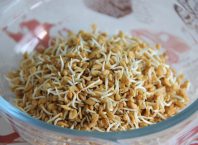Table of Contents
While many mothers assume that they should wean your child as soon as they start teething, it turns out that breastfeeding can positively impact an infant’s dental hygiene. Most people are aware that breastfeeding is good for a baby’s overall wellbeing. However, they might not be as aware that it can specifically help improve the oral health of infants as well. Feeding on mom’s milk may keep a baby’s teeth and entire mouth in good shape during these formative months. So perhaps parents should ditch the bottle! Here are some of the ways that breastfeeding improves dental health in babies.

Encourages Proper Alignment
Try as they might imitate the shape and design of a mother’s breast, bottles just aren’t the same. Breastfeeding requires that babies hold their mouths a certain way while eating, but bottles are more forgiving. As a result, bottle-fed babies may slip into feeding habits that don’t support proper oral development. Studies show that exclusively breastfed babies may be less prone to alignment problems as they grow up. For example, in one study, only 8.2 percent of children who had been breastfed for the first nine months experienced a posterior crossbite. That alignment problem showed up in at least 15 percent of their peers who hadn’t been breastfed as long. In other words, breastfeeding essentially trains a baby to have a proper oral posture that later affects their alignment.
Discourages Cavity Formation
The properties of breast milk may make a baby’s teeth less susceptible to cavities. For example, the high pH of human milk has been shown to possibly reduce bacterial growth. Its calcium content may, therefore, strengthen teeth. Of course, breast milk is not a magic pill that keeps all cavities at bay. Like other types of milk, it does contain sugar. Therefore, even breastfeeding parents need to be mindful of their babies’ oral health. It’s important to brush a baby’s teeth twice a day and make sure that even little ones receive regular dental care services. In the end, though, breast milk is certainly healthier than other alternatives for babies.
Keeps Bottles out of Bed
Putting babies to bed with bottles of milk or juice is a common cause of tooth decay. Sugary drinks may pool around the teeth of sleepy babies, which causes cavity formation. For breastfed children who don’t use bottles, this is less likely to be a concern. With breastfeeding, the source of nourishment stays outside the crib. Plus, the liquid is less likely to sit against the teeth for an extended period of time since the mother’s nipple delivers the milk toward the back of the mouth. All of this works to ensure healthier teeth.
Reduces Fluoride Overexposure
Fluoride is important for oral health, but you can get too much of a good thing. Excessive exposure can result in a condition called fluorosis that affects tooth appearance. In one study, fluorosis symptoms were present in more than 40 percent of children who regularly drank water with fluoride levels over 1.2 ppm. Bottle-fed babies may drink formula that is prepared with high-fluoride tap water. Although low-fluoride bottled water is available, breastfeeding is a more affordable way to ensure that your baby isn’t overexposed to fluoride.
A baby’s smile lights up the world. For parents, breastfeeding their baby is a great way to keep that beautiful smile in top shape, and it also has many other nutritional benefits. Some babies can be breastfed up until they’re two years old, so don’t assume that mothers should stop once the teeth show through. These are only some of the ways that breastfeeding positively impacts children.















